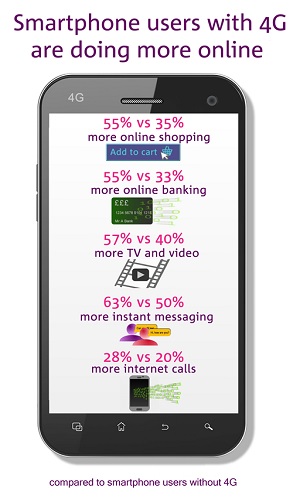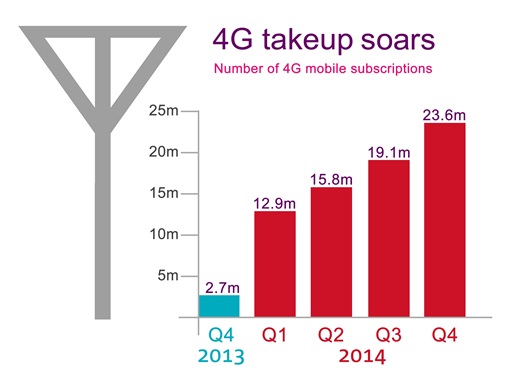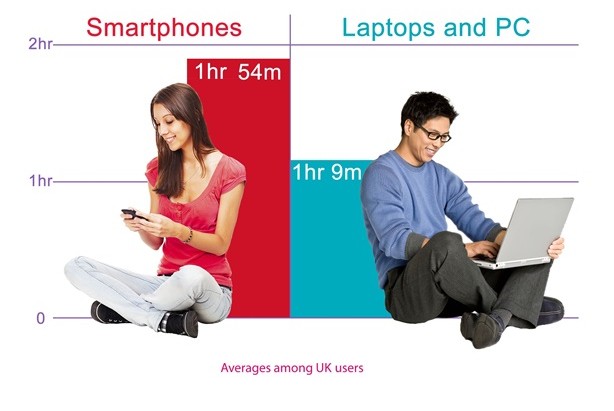Smartphones have overtaken laptops as the most popular device for getting online, Ofcom research has revealed, with record ownership and use transforming the way we communicate.
Some key findings from the report:
• Smartphones are now the preferred way to browse the internet
• Around a quarter of mobile internet users make a purchase on their phone or use it to find a store location
• Over half of UK households (54%) now have a tablet
• Internet users aged 16 and above spent over 20 hours and 30 minutes online each week in 2014
Two thirds of people now own a smartphone, using it for nearly two hours every day to browse the internet, access social media, bank and shop online.
Ofcom’s 2015 Communications Market Report finds that a third (33%) of internet users see their smartphone as the most important device for going online, compared to 30% who are still sticking with their laptop.
The rise in smartphone surfing marks a clear shift since 2014, when just 22% turned to their phone first, and 40% preferred their laptop.
Smartphones have become the hub of our daily lives and are now in the pockets of two thirds (66%) of UK adults, up from 39% in 2012. The vast majority (90%) of 16-24 year olds own one; but 55-64 year olds are also joining the smartphone revolution, with ownership in this age group more than doubling since 2012, from 19% to 50%.
The surge is being driven by the increasing take-up of 4G mobile broadband, providing faster online access. During 2014, 4G subscriptionsleapt from 2.7 million to 23.6 million.
We now spend almost twice as long online with our smartphones than on laptops and personal computers. On average, adult mobile users spent nearly two hours online each day using a smartphone in March 2015 (1 hour and 54 minutes), compared to just over an hour on laptops and PCs (1 hour and nine minutes).
But this is still only half of the 3 hours and 40 minutes we spend in front of the TV each day.
4G users are doing more
Smartphone users with 4G are shopping online more than those without 4G (55% of 4G users do this compared with 35% of non-4G users); banking more online (55% versus 33%); watching more TV and video clips online (57% versus 40%); making more face-to-face and voice calls over the internet (28% versus 20%); using services such as Snapchat to send more photos and videos (49% versus 36%); and instant messaging more with services such as WhatsApp (63% versus 50%).

At least one 4G mobile broadband service is now available to 89.5% of UK premises, with four in ten people (42%) able to choose from all four 4G providers -EE, O2, Three and Vodafone. The mobile operators continue to expand their 4G networks, and Ofcom rules mean that 98% of premises will have an indoor 4G signal from at least one operator by 2017.
Today, indoor 2G mobile voice coverage reaches 98% of people’s homes and offices. But that still leaves 2%, or half a million premises, without a signal.
Ofcom wants to see the widest possible availability of communications services and is considering what further options might be available to improve coverage, both mobile and fixed-line broadband, as part of the Digital Communications Review.
In the coming months, Ofcom will publish maps enabling consumers to compare operators’ mobile coverage throughout the UK. The maps will enable users to zoom to a specific location, or simply enter a place name or postcode, and receive data on coverage for each mobile network – down to 100 square metres.
Sharon White, Ofcom Chief Executive, said: “Today’s report shows just how important reliable, fast internet access is to millions of consumers and businesses. Improving the coverage and quality of all communications services across the UK is a priority for Ofcom, for people at work, home or on the move.”
James Thickett, Ofcom Director of Research, said: “4G has supercharged our smartphones, helping people do everything from the weekly shop to catching up with friends with a face-to-face video call. For the first time, smartphones have overtaken laptops as the UK’s most popular internet device and are now the hub of our daily lives.”
Selfies and storage
Smartphones now take more photos than any other device, including digital cameras, with 60% of adults saying they use it most to take a snap, rising to almost nine in ten (89%) of 16-24 year olds. Just over one in five adults (22%) mostly use their digital camera.

People in the UK took an estimated 1.2 billion ‘selfies’ in the past year. Nearly a third (31%) of UK adults admit to taking a selfie, with one in ten doing so at least once a week.
But not everyone is taking care of their digital snaps, with less than a third of adults (31%) backing up all their digital photos. Perhaps surprisingly, 16-34 year olds are the most careful, with 36% of this age group backing up all their digital pics, compared to just 29% of people aged 35 and older.
This may reflect the fact that those aged 35 and over are more likely to have framed photos on the mantelpiece. Seventy per cent of them have their favourite photos on display, compared to half (52%) of 16-34 year olds.
Mobile manners
Mobile phones may be a permanent fixture in our daily lives, but tweeting or updating social media status when sitting down to dinner remains a no-no for most people.
Over half of people (55%) think it’s unacceptable to pick up your phone alongside your knife and fork. Yet four in ten people admit to checking their phone at the dinner table.
One in three adults 34%) turn over and check their phones within five minutes of waking up. For young people, checking social media messages before breakfast is even more crucial – around half (49%) of young people aged 18-24 check their phones within five minutes of waking up.
But despite our increasing mobile use, birthday greetings still require more than a text message.
The traditional card sent through the post remains the most popular way to say ‘Happy Birthday’, with two fifths (38%) of people choosing to hand write their birthday wishes, compared to 15% using social media and just 7% sending a text message.
Time online doubles in a decade
Increasing take-up of smartphones and tablets is boosting time spent online. Over half of UK households (54%) now have a tablet, a rapid rise in popularity from just 2% in 2011.
Ofcom research shows that internet users aged 16 and above said they spend nearly 10 hours (9 hours and 54 minutes) online each week in 2005. It had climbed to over 20 hours and 30 minutes in 2014.
2014 saw the biggest increase in time spent online in a decade, with internet users spending over three and a half hours longer online each week than they did in 2013 (20 hours and 30 minutes in 2014, compared to 16 hours and 54 minutes in 2013).
Overall, people think their time online is bringing benefits. Almost two thirds (64%) of online adults agree that being online is invaluable for keeping them informed about current issues, and six in ten (60%) agree it helps keep them in touch with close family and friends.
But people overwhelmingly prefer to catch up with friends and family over a cup of tea. Almost seven in ten (69%) prefer to chat with family face-to-face, and 64% prefer to speak to friends this way, compared to just 3% who prefer social media for staying in touch.
TV viewing habits are changing
People’s growing reliance on smartphones and tablets appears to be affecting TV viewing.
Most 16-24 year olds are watching on-demand and catch up programmes on computers and smartphones rather than on a TV connected to a set-top box.
Nearly six in ten young people (57%) regularly watch on demand and catch-up TV on their laptop or PC. Almost half (45%) watch on a smartphone, and four in ten (40%) switch on a set-top box.
On smartphones, short-form video clips are even more popular than watching a film or TV programme: 42% of people say they watch short videos from services including YouTube, Instagram Video and Vine on their phone, compared to 21% watching a film or TV programme.
But, despite the growth in online viewing, TV still reaches the overwhelming majority of people. Over 90% (92%) watch TV each week, down slightly from 93% in 2013.
However, we are spending less time in front of the TV. On average we spent 3 hours and 40 minutes a day watching on a TV set in 2014, 11 minutes less than in 2013 and the second consecutive year of decline.
The greatest drop was seen among children (aged 4-15), falling by 12% from 2 hours and 14 minutes in 2013 to 1 hour and 58 minutes in 2014. Those aged 25-34 watched nearly 9% less, from 3 hours and 5 minutes to 2 hours and 49 minutes while 16-24 year olds watched 6% less TV, from 2 hours and 28 minutes to 2 hours and 18 minutes.
Industry analysis
Mark Haviland, MD, Rakuten Marketing Europe commented: “This report confirms that mobile is the preferred device for consumers online. However many retailers are delivering marketing campaigns that don’t address this; IAB research shows that just 10% of the top 250 UK brands are running display advertising campaigns without a mobile optimised site. It’s crucial that marketers respond to Ofcom’s research and change their approach to match how people are consuming the internet. A quarter of shoppers are purchasing on their smartphones, but a significant proportion of consumers are also using mobile devices within a longer purchase journey. They start by researching and comparing products on their mobile devices before moving to another screen, be that their PC, laptop, or even smartwatch. Marketers must realise the value of mobile as a facilitator for commerce on other channels. Only with an omnichannel approach and optimised, targeted advertising, can marketers provide a seamless and consistent customer experience and make the most of this mobile boom.”
Michael Allen, Solutions VP, Dynatrace said: “This report gives us an unmistakable sign of the huge opportunity that mobile provides as a digital business channel. However, our own research has shown that people have very high expectations when it comes to mobile; nearly a third of UK consumers will abandon a mobile website or app that fail to load within just three seconds. As such, if businesses want to reap the biggest rewards, their website has to be optimised to offer a seamless user-experience on mobile devices.
“Those that have implemented a solid digital performance strategy also stand to improve their rankings in search engines after Google recently updated its algorithms to account for how fast web pages load on a mobile device. With more of today’s consumers now running their searches through mobile rather than desktop devices, this will tip the scales significantly in favour of those with a mobile optimised website when it comes to being number one on Google.”

